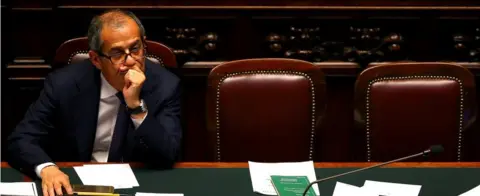European warnings over Italy's populist budget
 EPA
EPAThe Italian people will end up worse off under the populist government's ambitious spending plans, the European Union has warned.
EU Economics Commissioner Pierre Moscovici said plans setting the budget deficit at 2.4% of GDP will only add to Italy's €2.3tn ($2.7tn; £2tn) debt.
But Italy's coalition government, which denies it is seeking conflict with Brussels, insists the debt will fall.
However, the budget announcement has sent tremors through the system.
Italian stocks fell almost 4% on Friday, while the euro slipped below $1.16 for the first time in two weeks.
How is Italy defying the EU?
Mr Moscovici said the European Commission had "no interest in a crisis" - words echoed by Italy's Deputy Prime Minister Luigi Di Maio.
However, Mr Moscovici added that Italy was "not respecting the rules" and reducing its "explosive" debt.
The budget decision is well short of the EU's deficit limit of 3% of GDP.
But Italy, the third-biggest economy in the eurozone, had promised to cut its debt decisively. The debt stands at 131% of national output, second only to Greece.
Before the populist parties came to power this year, the centre-left government was aiming for a 0.8% budget deficit with a view to balancing its books by 2020.
By appointing technocrat Giovanni Tria as finance minister, coalition partners the League and Five Star had sought to reassure both the financial markets and Brussels.
But Mr Tria, who had sought to limit the budget deficit to below 2% of GDP, to avoid adding to Italy's €2.3tn debt, was apparently overruled.
The 2.4% budget deficit is set for 2019 and the following two years as well.
Mr Moscovici said servicing such a large debt meant that every euro spent on it was "one euro less on roads, one euro less on education and one euro less on social justice".
What's more, he was "persuaded that it's not in the interest of Italy and the Italians" to get into more debt.
"Spending your way out of economic trouble ends up working against those who do it," he continued. "And it's always the people who pay the price in the end."
What has the Italian government said?
Deputy Prime Minister Matteo Salvini hit back at the suggestion Italians would end up worse off at a news conference on Friday.
"Italians' right to health, jobs and pensions come before European threats... or any arguments of EU bureaucrats," the League leader, who has previously questioned why Italy should be shackled by European limits, said.
 Getty Images
Getty ImagesThe budget allows them to set aside €10bn for Five Star's key election promise of a minimum income for the unemployed.
They argue reforms like this will help the economy grow - allowing them to reduce the deficit.
"We want to pay back the debt and I can assure you the debt will go down," Mr Di Maio told journalists.
What exactly are the populists promising?
They swept to power pledging a series of tax cuts, new social welfare policies and better pensions - all expensive programmes.
 Reuters
Reuters"We, in a decisive manner, with this budget law, will have abolished poverty," Luigi Di Maio, deputy prime minister and leader of the Five Star party, said ahead of Thursday's crunch meeting.
The plans must be approved by the parliament in October.
Among the ambitious plans at election time were:
- A guaranteed basic income for poor families of about €780 a month
- Tax reform for rates of just 15% and 20%, down from 23%-43%, which could cost up to €50bn
- Abolishing plans to raise retirement age over several years, and setting minimum pensions
What are the experts saying?
The overnight news hit Italian borrowing costs - with the yield on 10-year government bonds rising above 3%. Meanwhile, the Milan stock exchange fell almost 4% on Friday morning, with trading in Banco BPM bank stocks suspended after they tumbled nearly 11%.
All eyes were on the "spread" - the gap between Italian and German bond yields - which was at its widest for three weeks.
Stewart Robertson, senior economist at Aviva Investors, told news agency Reuters: "Markets have passed their judgement already and it's pretty clear they don't like it."
However, a stand-off with the EU may still be some way away, according to Holger Schmieding, chief economist at Berenberg Bank.
"As long as Italy does not breach the 3% limit, the EU will likely admonish Italy without imposing a fine that could trigger an anti-European backlash in Italy," he said.
But, he added: "An Italian debt crisis remains an accident waiting to happen."
The budget will have to be submitted to the European Commission by mid-October.
